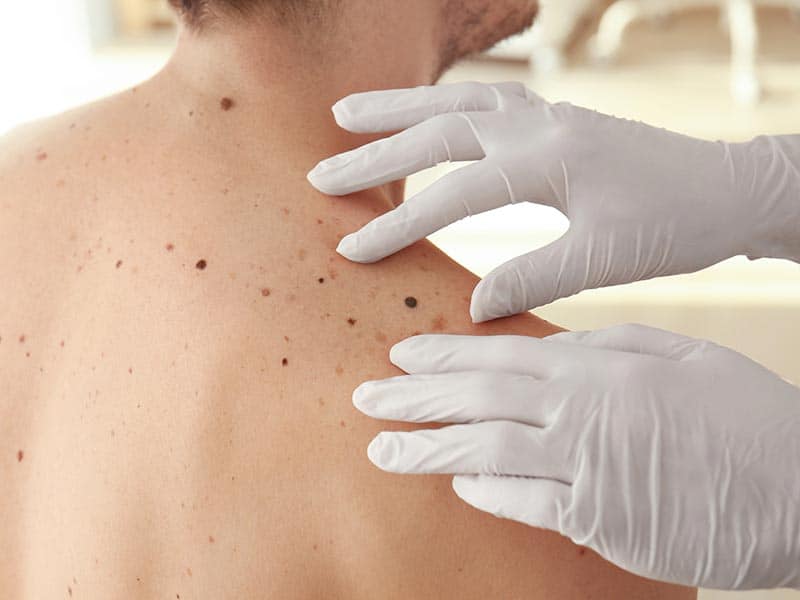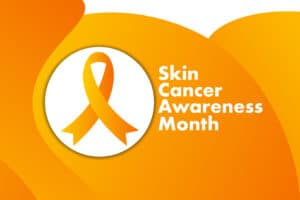Award winning dermatology service, with over 20 years of experience
Short waiting lists, on some occasions offering same week appointments
Safe environment, in Care Quality Commission approved facilities
Mole Treatments Include:
Everything you need to know
Skin cancer is the most common form of cancer in the UK, with over 400 people being diagnosed every day1. Melanoma skin cancer is on the rise, with incidence rates increasing by 45% in the UK in the last decade, despite the warnings of the dangerous effects of sun exposure. Most skin cancer is caused by ultraviolet (UV) light in the form of sunlight or tanning beds, which damages skin cells. Early detection of skin cancer, through examination and regular monitoring of moles, saves lives and if caught and treated early enough there is a 100% chance of survival. However, if left to develop and evolve, melanoma can become fatal which is why we strongly recommend having your moles checked regularly. Our professional team of dedicated cancer specialists can provide you with the reassurance of a correct diagnosis.
HOW CAN MOLES BE CHECKED?
It is a good idea to check your moles at home once a month, especially if you have lots of moles or freckles (particularly if some are large), have fair hair or skin, use sunbeds or have a family history of skin cancer.
When checking your moles, use both a full length and a hand held mirror so you are able to check your body all over. Stand in a well lit room and ask a family member or your partner to help you check the hard to reach areas. Don’t forget to check less obvious places such as your scalp, the soles of your feet and in between your fingers and toes.
When checking your body for moles, you are looking for any changes to the size, colour of shape. You are also looking for itching, bleeding or crusting of moles which are signs you need to book an appointment to get your moles checked by a consultant dermatologist. If you are unsure about a mole, it is really important to get it checked by an expert.
SINGLE MOLE CHECK
If you have a single mole which you are concerned about and would like to be checked by an expert, book in for a single mole check at Stratum Dermatology Clinics. The mole in question will be scanned with a dermascope by a specialist nurse which will then be sent to one of our consultant dermatologists to be reviewed. If the consultant is concerned you will be invited into the clinic for further investigation. If you have more than one mole you are concerned about, we would recommend a full body mole check or full body mole mapping.
For the single mole check we cannot investigate moles which are located in an intimate part of the body, are on the eyelid or top of the ear, covered by an excessive amount of hair, are on a tattoo or are wet, open or bleeding. If you have any questions on this, please get in contact. If your mole or lesion requires further investigations, we may need to excise (remove) all or part of it to be assessed for cancer. Your specialist can advise during your appointment. Please note, single mole checks are not available at Stratum Dermatology Clinic Oxford.
FULL BODY MOLE CHECK
If you have multiple moles on your body which you would like to be checked by an expert, book a full body mole check at Stratum Dermatology Clinics with a consultant dermatologist. Your moles will be assessed and if your consultant is concerned with any of them and they require further investigation or treatment, this will be discussed with you. Our dermatologists are highly qualified, hospital based consultants who are all members of the British Association of Dermatologists, the Royal Society of Medicine, the General Medical Council and the Royal College of Physicians.
FULL BODY MOLE MAPPING
Full body mole mapping at Stratum Dermatology Clinics uses state-of-the-art DermEngine to map your moles and provide a permanent record so any changes over time can be quickly identified and investigated. This system provides computer mapping of your entire skin and high resolution mapping of individual moles. The images taken will be analysed by a consultant dermatologist, mapped and recorded. The ability to compare images and identify changes in the appearance of moles makes it a highly accurate tool in identifying the development of skin cancer. As part of the mole mapping service, you will be provided with a record of your images so you can review them any time. You will be invited back for an annual review to check for any changes to your moles but of course if you notice any changes to your moles sooner you can make an appointment to get them checked.
FREQUENTLY ASKED QUESTIONS
HOW OFTEN DO I NEED MY MOLES CHECKED?
We recommend an annual review of your moles to identify any changes which may have occurred since your last appointment. However those at risk of skin cancer might need to be seen more frequently than this. We will send you a reminder to book your annual check. If you notice any changes to your moles between appointments, please contact us to book a mole check appointment.
WHAT HAPPENS IF I HAVE A PRECANCEROUS MOLE?
At Stratum Dermatology Clinics, we are able to remove your mole if your consultant dermatologist is concerned, or if you would like it removed for cosmetic reasons. Your consultant dermatologist will discuss your options with you during your appointment if required.
HOW DO I KNOW WHICH MOLE CHECK IS RIGHT FOR ME?
It depends on your circumstances, family history and background. We recommend that you speak to one of our experts and they can suggest the best form of treatment for you.
HOW CAN I CHECK MY OWN MOLES?
It is a good idea to check your moles once a month, especially if you have lots of moles or freckles (particularly if some are large), have fair hair or skin, use sunbeds or have a family history of skin cancer.
When checking your moles, it is a good idea to use both a full length and a hand held mirror so you are able to check your body all over. Stand in a well lit room and ask a family member or your partner to help you check the hard to reach areas. Don’t forget to check less obvious places such as your scalp, the soles of your feet and in between your fingers and toes.
When checking your body for moles, you are looking for any changes to the size, colour of shape. You are also looking for itching, bleeding or crusting of moles which are signs you need to book an appointment to get your moles checked by a consultant dermatologist.
Mole Treatment Process:
Book Assessment
Contact us to arrange a no-obligation consultation with our experienced specialist who will examine and discuss your stage of acne.
Appropriate Treatment Identified
There are a wide range of treatment options available depending on the severity and location of your acne. Our experienced dermatologist will explain all of your treatment options and help you to decide the best programme for you.
Treatment Begins
Once an appropriate treatment has been agreed upon, the treatment programme begins, and you’ll be well on your way to a healthier, happier skin. Results will likely appear within the timeframe suggested by your acne specialist.
REQUEST A CALL BACK
Please fill in this form and one of our team will give you a call back to arrange a consultation with one of our expert dermatologists.

HEAR FROM OUR PATIENTS
WHY CHOOSE mole treatment FROM STRATUM DERMATOLOGY CLINICS?
If you are looking for a private skin cancer clinic, Stratum Dermatology Clinics have clinics nationwide offering mole checking, mole removal and mole treatment. Here at Stratum Dermatology Clinics, we understand how skin conditions can negatively impact your life. We help hundreds of patients each month and our dermatology experts have a wealth of experience in the assessment, treatment and management of all types of skin cancers.
The main symptom of melanoma skin cancer is a change to an existing mole or freckle or the appearance of a new mole. It is therefore vital that moles are checked regularly and any changes are noticed and seen by a doctor. The earlier melanoma skin cancer is identified, the easier it is to treat and cure.
We work with leading experts in the field of dermatology to ensure you have the best experience and mole treatment. Stratum Dermatology Clinics are regulated by the Care Quality Commission, are part of the British Association of Dermatologists and are top rated by patients on Doctify and Trustpilot. Both Stratum Dermatology Clinics and the consultants who work here are recognised by the main healthcare insurance providers.
Mole & skin cancer INSIGHTS AND ADVICE

When Should I Worry About A Mole
WHEN SHOULD I WORRY ABOUT A MOLE? A mole is a coloured spot on the skin which is made up of a cluster of cells known as melanocytes which are responsible for producing the pigment in your skin. Sometimes these melanocytes grow in a cluster

What are the common types of skin cancer?
WHAT ARE THE COMMON TYPES OF SKIN CANCER? There are three main types of skin cancer, basal cell carcinoma (BCC), squamous cell carcinoma (SCC) and melanoma. The first two are both known as non-melanoma skin cancer and are the most common varieties. Non-melanoma skin cancer

Skin Cancer Awareness Month
SKIN CANCER AWARENESS MONTH. Skin cancer awareness month takes place every May with the aim of raising awareness of the dangers of unprotected sun exposure and educating on the ways skin cancer can be prevented. During skin cancer awareness month, the British Association of Dermatologists